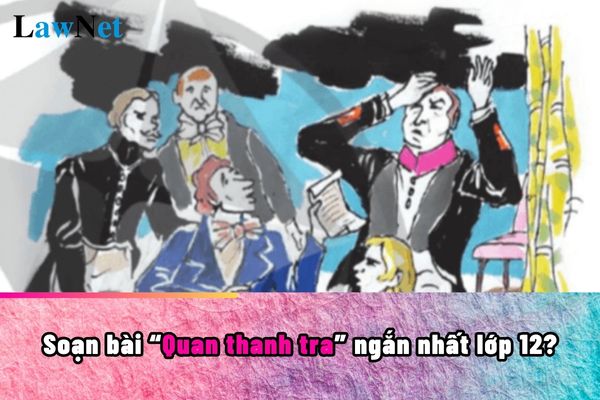What are guidelines on preparing the lesson "Quan thanh tra" for grade 12 students in Vietnam? What are the language proficiency requirements for grade 12 students in Vietnam?
What are guidelines on preparing the lesson "Quan thanh tra" for grade 12 students in Vietnam?
"Quan thanh tra" is one of the texts that students will learn in the Grade 12 Literature curriculum in Vietnam.
Below are guidelines on preparing the lesson "Quan thanh tra" for grade 12 students.
|
Guidelines on preparing the lesson "Quan thanh tra" for grade 12 students in Vietnam * Main content: |
Note: The information is for reference only./.

What are guidelines on preparing the lesson "Quan thanh tra" for grade 12 students in Vietnam? What are the language proficiency requirements for grade 12 students in Vietnam? (Image from the Internet)
What are the language proficiency requirements for grade 12 students in Vietnam?
Pursuant to Section IV of the Grade 12 Literature curriculum issued together with Circular 32/2018/TT-BGDDT, Grade 12 students will learn the following content in Literature:
- Requirements to be achieved at the upper secondary school level
+ Language proficiency
Know how to apply knowledge of Vietnamese language and knowledge of historical, social, ideological, philosophical, and aesthetic contexts of periods to understand more complex texts (in terms of volume, complexity, and comprehension requirements).
Know how to analyze and evaluate content and notable characteristics of the text's expression form, especially creativity in language, writing style, and text type. Students should have their own perspective on people and life; see the role and effect of reading on themselves.
From Grade 10 to Grade 12: proficiently writing argumentative and expository texts on topics related to life and career orientation; writing correctly following the process, combining various expressive means, argumentative styles, and artistic elements; having personal views on a social issue.
Able to write argumentative and informative texts on relatively complex topics; argumentative texts require analysis, evaluation, and comparison of the value of literary works; discussing issues appropriate for near-adulthood age, requiring relatively complex structure and argumentation, with evidence sought from various sources; expository texts on scientific issues in the form of a properly formatted research report; respecting intellectual property rights and avoiding plagiarism.
The writing should reflect emotions, attitudes, experiences, and ideas of the individual on issues raised in the text; demonstrating a personal perspective, thinking, and living style.
Able to debate issues where there are opposing viewpoints; having a constructive attitude and proper debate culture; able to listen to presentations and evaluate the content and form of the presentation; keen to express personal views and individuality in debates; presenting scientific issues confidently and persuasively. Speaking and listening flexibly; mastering the methods and procedures of conducting a debate.
What are regulations on types of literary texts used for Grade 12 Literature in Vietnam?
As stipulated in subsection 2 Section 5 of the Grade 12 Literature curriculum issued together with Circular 32/2018/TT-BGDDT, the types of texts for Grade 12 Literature include the following:
(1). Literary texts
- Legendary stories, modern short stories and novels
- Modern lyrical poetry
- Comedy
- Reportage, diaries or memoirs
(2). Argumentative texts
- Social argumentative essays
- Literary argumentative essays
(3). Informative texts
- Expository texts incorporating one or more elements like description, narration, expression, argument
- Research reports, work exchange letters.

